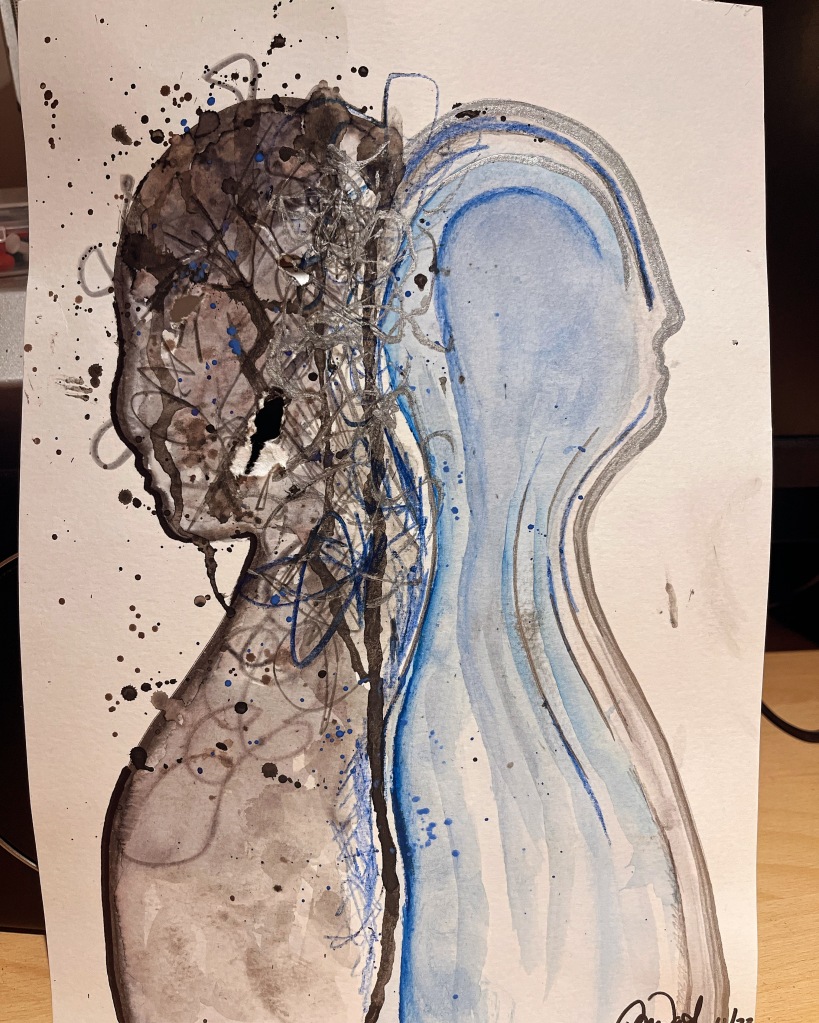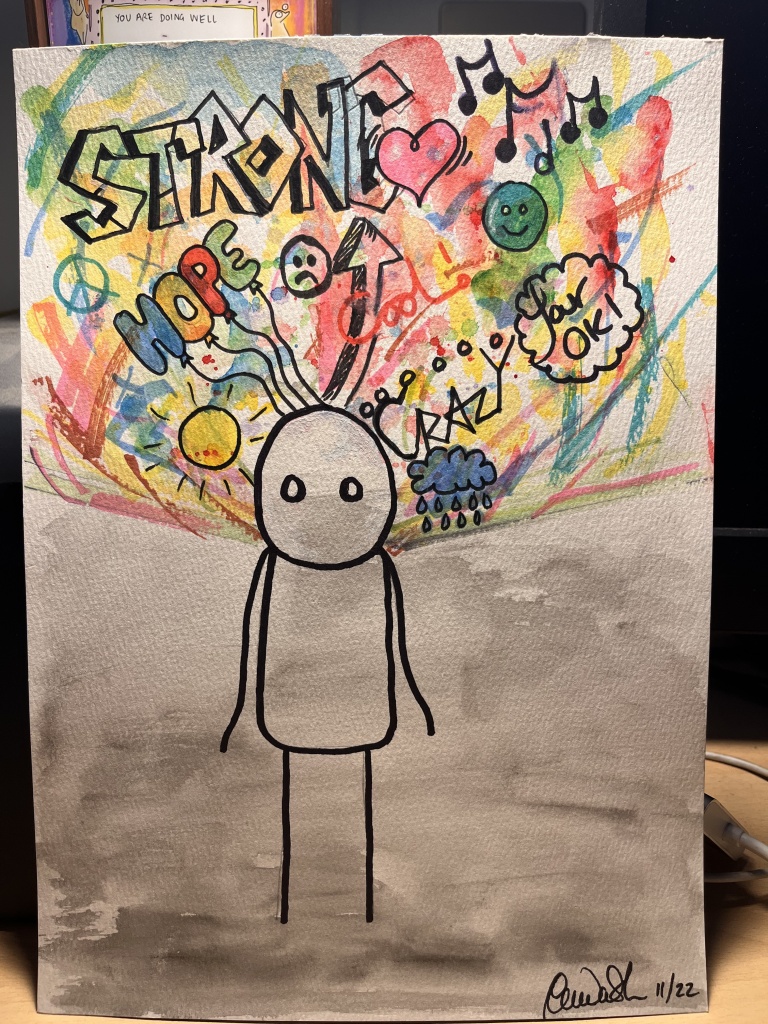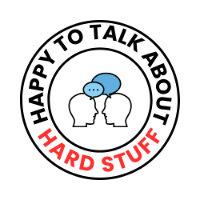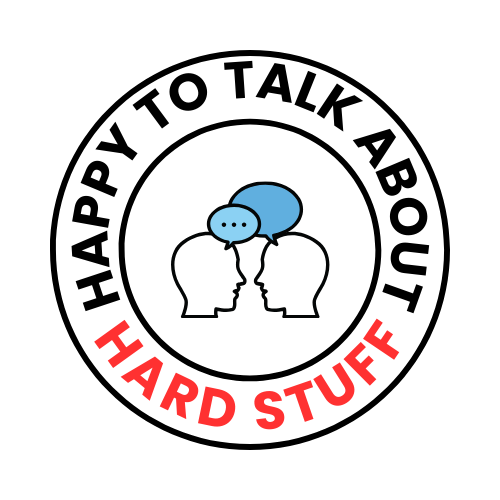For those that perhaps don’t know. My name is Mig. I have bipolar disorder type ii, with traits of BPD and OCD. Diagnosis is often a complicated thing! To make matters worse they are also exploring autism / adhd diagnoses. Let’s just agree that I am neuro spicy, and my head doesn’t work like the average head might do.
Two and half years ago I was admitted to hospital because I tried to take my own life.
Since that crisis admission it has been a long process of learning to recover and live again. To rebuild a life where I smile more, which is easier said than done. A journey of self-discovery, of reflection and unlearning some unhelpful coping strategies and learning newer healthier ones. One such strategy that has been drummed into me from various interventions was learning to talk.
We talk every day, to people we encounter, for work, to communicate with others. It’s a skill we learn as a child and eventually engage with each day without much thought. However, when asked to talk about things that are difficult it doesn’t come as naturally. In fact, we are culturally programmed to avoid these interactions. Things that broach difficult subjects, that evoke feelings of fear, sadness, or pain. Things that we are emotionally attached to and fear the dialog that might unfold, things that make us feel vulnerable. I could ponder on why this might be? Societies inherent fixation on how they appear to others, of not appearing weak maybe? Children are better at talking; in fact, we encourage it. I want my 6-year-old daughter to tell me anything, I say it all the time to her. When then do we flip and start to feel the need to keep harder thoughts and feelings to ourselves? When does our mindset change to feeling we are alone and can no longer talk or share like we did as a child? Probably a myriad of reasons and not ones I want to dwell on in this blog. What we do know is that people are programmed to not talk about hard things, the things that really matter, the ones that evoke emotions and feelings; and 2 and half years ago I was no exception to the rule and as a result I ended up in hospital having decided I simply couldn’t navigate life.
In my lifetime on so many occasions I have been forced into NHS interventions that in essence have wanted me to learn to talk. However, it took an acute crisis situation and trip to hospital before I really understood that unless I actually learnt this skill I would probably wind up dead. A harsh but fair reality check.
If you linger and dwell on the “hard” stuff it festers inside your head. What do I mean by the hard stuff? Stress at work, that poor relationship with a line manager that’s getting you down, relationship issues with your partner or maybe your moving house and you’re finding it tough. The “tough” stuff is anything that doesn’t make you smile, anything that makes you sad. If those thoughts and feelings stay inside your head, they can manifest and grow. They can evolve and mutate; they can change and eventually they can consume you. If you do that with those tough things, they can make your brain a difficult place to be, but let’s say you do that with another, and another. Suddenly your brain is cluttered and overwhelmed, it becomes an all-consuming place to be.

Mig Walsh Art Therapy – Nov 2023
I have learnt that talking about the “tough” things brings them to life. It gets them out of my head. They can’t take root and control me if I articulate them, talk them through and bring them out into the open. Talking doesn’t make the hard things go away, it allows me to be in control of the narrative, the thoughts don’t get to burden me if I start to talk and understand them more. If I’m lucky the person I’m talking too might understand, they might have some ideas, or they might have even been there too, you never know.
Talking is like a muscle. It requires exercise and practice to develop and grow. If that muscle lays dormant and idle for a long time, when you give it a workout it will be hard work and leave you stiff and in pain. It takes perseverance, practice, and commitment for that muscle to develop; to get past the painful bit and for it to get easier, until talking becomes a part of your routine.
So how did I learn, what did I do to get past the painful bit and practice. Some things I did to help me:
- I started with a journal. Where I free form just wrote my thoughts. It wasn’t talking, but I was starting to think about the hard stuff. To form words and begin to articulate them and get them out of my head, even if it was onto a page.
- When thinking about getting verbal I started small. Flexed those talking muscles and challenged myself to talk more day to day. I talked to the person at the check out counter in the shops. The person in the parkrun funnel next to me, or at the bus stop. Now it wasn’t about hard stuff, but having the confidence to talk with a stranger was a nice stepping stone for me to embrace the awkward bit of talking. I was genuinely surprised at where the chats went, some went further that I was expecting.
- I picked one or 2 people to start with. People I trusted. I told them what I wanted to do, that I wanted to talk more about the stuff that mattered. I asked if they were on board. It was important to me to have a person that would help me do this, who would hold me to account.
- Still to this day even though I’m better at talking it normally starts with a text message or email. It’s my transition method to get me to talking. Often the text message is the thing that holds me to account.
- My journal still helps me to organise and order my thoughts and feelings. It’s simple, I list the things that make me smile on one side and the things that don’t on the other. If I’m doing this exercise, it means the things that make me not smile are far outweighing the ones that do make me smile. It’s important though to list things that do make you smile. Even if there are only 1 or 2. You need the balance. If you can’t list any, then I would suggest things are a lot worse than you are letting on, get some help asap. Once I have them all out on the page, I can then see who or what I need to start talking about.

Mig Walsh Art Therapy – Nov 2022
So, at the grand old age of 43 I have learnt the value of talking. You would think that this story ends well. I’m a new changed and enlightened lady, vibing with my newfound talking skills and feeling so much better. If only it were that simple….
I have learnt 3 things since I have embraced the value of talking:
1 – Sometimes there is no one to talk to and some people don’t have anyone to talk to.
This is where my journal comes in handy. That’s always by my side. A place to express articulate and get the hard stuff out of my head.
Some people don’t have family or close friends, their network is closed. I felt very much like this 2 and half years ago. However, I have found that 9 times out of 10 its us that close off the possibilities of connections. If you feel you have no one, I can assure you there are good people out there that do care and want to help, as told to me from a wise psychology researcher friend. You just have to persevere and find them.
2 – Not everyone is ready to listen.
Most people are inherently caught up and engrossed in their own worlds. Which I don’t overly begrudge them for. You need to learn the read the cues when a person asks how you are. It will be pretty clear if it’s a flippant passing British phrase which they don’t overly want a long answer to. I wish we could all agree to only ask this if we have the time to listen to the reply that might come. I won’t ask if you’re ok if I can’t find time and space to hear the answer. The key is not to give up. There are good people out there that are in the listening club, go find them, or revert to your trusted people.
3 – You might have learnt to talk, but most people haven’t, and they struggle or can’t.
There are so many people I wish I could talk to, but the reality is they aren’t where I am in my discovery that talking really helps. I can’t push them, it’s their journey to make. What I can do is gently educate them and encourage them. I don’t mean preaching, or pushing, but simply reminding them I’m here to listen and talk too. I just tell them I am looking forward to the time when we can talk more about the things that matter. Be kind, we are all on journey to unlearn this trait of not talking about the hard stuff.
I have learnt the value of talking. It’s been a tough journey for me to learn to develop this muscle, but I ‘get’ the benefits of doing it now. It is however hard to be a “talker” in a society full of “non talkers”. It’s hard to exercise that muscle when the odds are there aren’t many people you can train with.
So, this mental health awareness week 2024 I ask you, are you a talker? If you aren’t would you consider joining our group of people that are happy to talk about the hard stuff?
My name is Mig. I have bipolar disorder. I am a proud talker now. I have trained hard to work my talking muscle. I’m recruiting fellow talkers, in the hope of trying to start a cultural revolution of people that aren’t afraid to talk about the “hard” stuff. The stuff that matters, the stuff that if we don’t get out can make us ill. Talking can heal, talking makes us feel less alone, in talking we can find allies. We can invest in a culture of talking without a huge budget. All we have to do is be willing and invest time.

If you see me out and about, just know I’m a proud talker and I’m ready to listen.
Look after yourselves and if you’re not ok find a talker there are more of us than you think 😉
